身体部位英文短语
- 格式:doc
- 大小:45.50 KB
- 文档页数:8
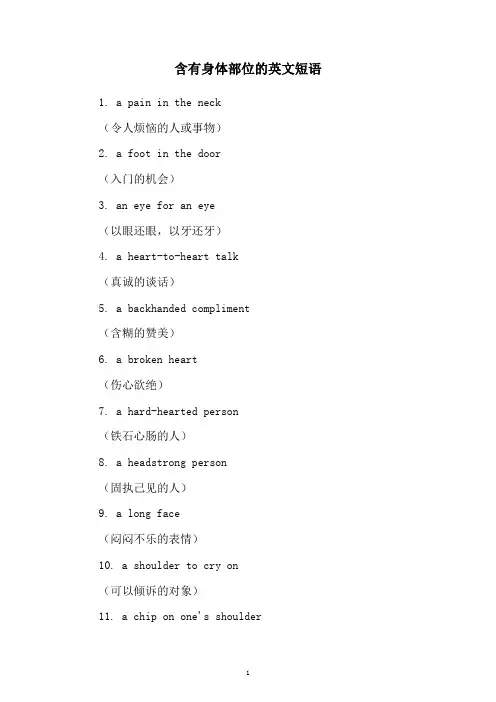
含有身体部位的英文短语1. a pain in the neck(令人烦恼的人或事物)2. a foot in the door(入门的机会)3. an eye for an eye(以眼还眼,以牙还牙)4. a heart-to-heart talk(真诚的谈话)5. a backhanded compliment(含糊的赞美)6. a broken heart(伤心欲绝)7. a hard-hearted person(铁石心肠的人)8. a headstrong person(固执己见的人)9. a long face(闷闷不乐的表情)10. a shoulder to cry on(可以倾诉的对象)11. a chip on one's shoulder(对某人怀有怨恨)12. a hand in glove(关系密切,勾结)13. a head above water(勉强维持,不过得很艰难)14. a leg to stand on(站得住脚的理由)15. a pain in the ass(令人讨厌的人或事物)16. a piece of cake(易事,轻而易举的事)17. a sticky situation(困境,麻烦的处境)18. a thorn in one's flesh(肉中刺,心中难以忍受的人或事物)19. a weight on one's shoulders (沉重的负担)20. a wrench in the heart(心中的痛苦)。
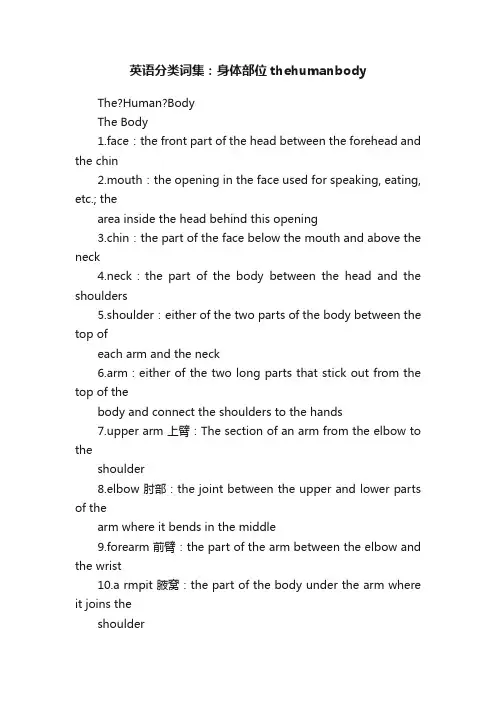
英语分类词集:身体部位thehumanbodyThe?Human?BodyThe Body1.face:the front part of the head between the forehead and the chin2.mouth:the opening in the face used for speaking, eating, etc.; thearea inside the head behind this opening3.chin:the part of the face below the mouth and above the neck4.neck:the part of the body between the head and the shoulders5.shoulder:either of the two parts of the body between the top ofeach arm and the neck6.arm:either of the two long parts that stick out from the top of thebody and connect the shoulders to the hands7.upper arm 上臂:The section of an arm from the elbow to theshoulder8.elbow 肘部:the joint between the upper and lower parts of thearm where it bends in the middle9.forearm 前臂:the part of the arm between the elbow and the wrist10.a rmpit 腋窝:the part of the body under the arm where it joins theshoulder11.b ack:the part of the human body that is on the opposite side tothe chest, between the neck and the tops of the legs; the part of an animal's body that corresponds to this12.c hest:the top part of the front of the body, between the neck andthe stomach13.w aist:the area around the middle of the body between the ribsand the hips, often narrower than the areas above and below 14.a bdomen 腹部:the part of the body below the chest thatcontains the stomach, bowels, etc.15.b uttocks? ['b?t?k]半边臀部:either of the two round soft parts atthe top of a person's legs16.h ip 臀部:the area at either side of the body between the top ofthe leg and the waist; the joint at the top of the leg17.l eg:one of the long parts that connect the feet to the rest of thebody?- countable18.t high:the top part of the leg between the knee and the hip19.k nee:the joint between the top and bottom parts of the legwhere it bends in the middle20.c alf 小腿:the back part of the leg between the ankle and the knee?- countableThe Hand1.wrist 手腕:2.knuckle??/(k)-nu-ckle/指节:any of the joints in the fingers,especially those connecting the fingers to the rest of the hand?-countable3.fingernail:the thin hard layer that covers the outer tip of eachfinger4.thumb:the short thick finger at the side of the hand, slightly apartfrom the other four5.(index)finger:the finger next to the thumb6.middle finger:the longest finger in the middle of each hand7.ring finger:the finger next to the smallest one, especially on theleft hand, on which a wedding ring is traditionally worn8.little finger:the smallest finger of the hand9.palm:the inner surface of the hand between the wrist and thefingers10.l unula?lu-nu-la 甲半月,小太阳:The white area at the base of afingernailThe Head2.part (头发的)分份儿3.forehead4.sideburn 鬓角5.ear6.cheek7.nose8.nostril ['n?stril] 鼻孔9.jaw 下巴10.b eard 胡须11.m ustache 胡子12.t ongue13.t ooth14.l ipThe Eye1.eyebrow? ['aibrau] 眉毛2.eyelid 眼皮3.eyelashes 睫毛4.iris ['ai?ris] 虹膜5.pupil? ['pjup?l] 瞳孔The Foot2.heel3.instep4.ball5.big toe6.toe7.little toe8.toenailThe Internal Organs1.brain2.spinal cord? ['spain?l] 脊髓3.throat4.windpipe/trachea 气管5.esophagus? [i:'s?f?ɡ?s] e-so-pha-gus 食道/gullet6.muscle7.lung8.heart9.liver10.s tomach11.i ntestines 肠12.v ein 血管13.a rtery? ['ɑ:t?ri] ar-te-ry 动脉14.k idney15.p ancreas? ['p?nkri?s] pan-cre-a-s 胰腺16.b ladder? ['bl?d?]?b-la-dder 膀胱。
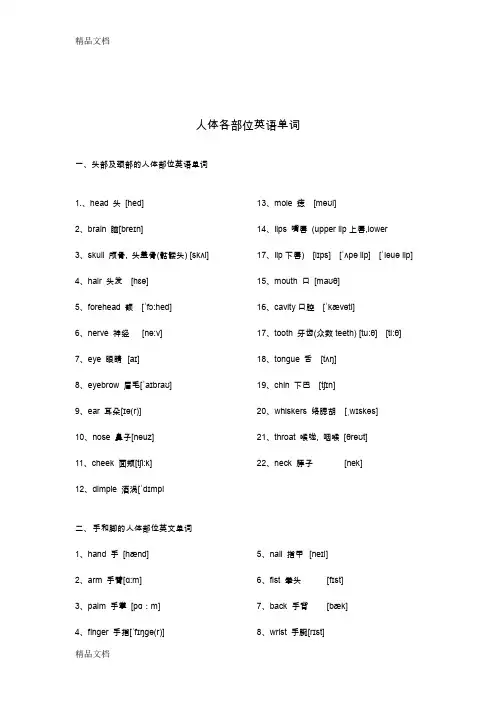
人体各部位英语单词一、头部及颈部的人体部位英语单词1.、head 头[hed]2、brain 脑[breɪn]3、skull 颅骨, 头盖骨(骷髅头) [skʌl]4、hair 头发[hɛə]5、forehead 额[ˈfɔ:hed]6、nerve 神经[nə:v]7、eye 眼睛[aɪ]8、eyebrow 眉毛[ˈaɪbraʊ]9、ear 耳朵[ɪə(r)]10、nose 鼻子[nəuz]11、cheek 面颊[tʃi:k]12、dimple 酒涡[ˈdɪmpl 13、mole 痣[məʊl]14、lips 嘴唇(upper lip上唇,lower17、lip下唇) [lɪps] [ˈʌpə lip] [ˈləuə lip]15、mouth 口[maʊθ]16、cavity口腔[ˈkævəti]17、tooth 牙齿(众数teeth) [tu:θ] [ti:θ]18、tongue 舌[tʌŋ]19、chin 下巴[tʃɪn]20、whiskers 络腮胡[ˌwɪskəs]21、throat 喉咙, 咽喉[θrəʊt]22、neck 脖子[nek]二、手和脚的人体部位英文单词1、hand 手[hænd]2、arm 手臂[ɑ:m]3、palm 手掌[pɑ:m]4、finger 手指[ˈfɪŋgə(r)]5、nail 指甲[neɪl]6、fist 拳头[fɪst]7、back 手背[bæk]8、wrist 手腕[rɪst]9、elbow 肘[ˈelbəu]10、bone 骨[bəʊn]11、skeleton 骨骼[ˈskelɪtn]12、thigh 大腿[θaɪ]13、muscle 肌肉[ˈmʌsl] 14、knee 膝盖[ni:]15、leg 腿[leg]16、shank 小腿[ʃæŋk]17、foot 脚[fut]三、人体胸部和下半身各部位英语单词1、shoulder 肩[ˈʃəuldə]2、pit 胸口[pɪt]3、joint 关节[dʒɔɪnt]4、chest 胸部[tʃest]5、abdomen 腹部[ˈæbdəmən]6、navel 肚脐[ˈneɪvl]7、waist 腰[weɪst]8、back 背[bæk]9、backbone 脊柱[ˈbækbəʊn]10、hip 臀部[hɪp]11、bottom 屁股[ˈbɔtəm]四、内脏各部位英语单词1、vein 静脉[veɪn]2、artery 动脉[ˈɑ:təri]3、capillary 毛细血管[kəˈpɪləri]4、nerve 神经[nɜ:v]5、spinal marrow 脊髓 [ˈspaɪnəl ˈmærəʊ]6、internal organs 内脏[ɪnˈtɜ:nl][ˈɔ:ɡənz]7、heart 心脏[hɑ:t]8、blood vessel 血管[blʌd ˈvesəl]9、lung 肺[lʌŋ]10、kidney 肾脏[ˈkɪdni]11、stomach 胃[ˈstʌmək]12、gullet 食管[ˈgʌlɪt]13、liver 肝脏[ˈlɪvə(r)]14、pancreas 胰腺[ˈpæŋkriəs]15、spleen 脾[spli:n]16、small intestine 小肠[smɔ:l ɪnˈtestɪn]17、large intestine 大肠[lɑ:dʒɪnˈtestɪn]18、anus 肛门[ˈeɪnəs] 19、bladder 膀胱[ˈblædə(r)]20、urine 尿道[ˈjʊərɪn]常见蔬菜1 tomato [tə'mɑ:təʊ] 西红柿2、lettuce ['letɪs] 莴苣3 cucumber ['kju:kʌmbə] 黄瓜4 aubergine ['əʊbəʒi:n], eggplant ['egplɑ:nt] ]茄子5 celery ['selərɪ] 芹菜6 onion ['ʌnjən ]洋葱7 pea [pi:] 豌豆8 mushroom ['mʌʃru:m] 蘑菇9 pumpkin ['pʌm(p)kɪn] 南瓜10 rape [reɪp] 油菜11 spinach [ˈspɪnɪtʃ] 菠菜12 beet, beetroot ['bi:tru:t] 甜菜13 potato [pə'teɪtəʊ] 马铃薯14 radish ['rædɪʃ] 萝卜15 carrot ['kærət] 胡萝卜16 cabbage ['kæbɪdʒ] 卷心菜17 Chinese cabbage 大白菜18 chilli ['tʃɪlɪ] 辣椒19 garlic ['gɑ:lɪk] 蒜20 chive [tʃaiv] 葱常见动物类1 horse [hɔ:s] 马2 mare [meə] 母马3 colt [kəʊlt] foal [fəʊl] 小马4 mustang ['mʌstæŋ] 野马5 hippopotamus [,hɪpə'pɒtəməs] 河马6 zebra ['zebrə] 斑马7 ox [ɑks] 牛8 buffalo ['bʌfələʊ] 水牛9 Bulls、[bulz] 公牛10 cow [kaʊ] 母牛11 calf [kɑ:f] 小牛12 heifer ['hefə] 小母牛13 rhinoceros [raɪ'nɒs(ə)rəs] 犀牛14 yak [jæk] 牦牛15 eagle ['i:g(ə)l] 鹰16 mule [mju:l] 骡17 ass, donkey 驴18 cock [kɒk] 公鸡19 hen [hen] 母鸡20 chicken ['tʃɪkɪn] 小鸡21 peacock ['pi:kɒk] 孔雀22 duck [dʌk] 鸭23 pig, swine [swaɪn] 猪24 gilt [gɪlt] 小母猪25 piglet ['pɪɡlət] 猪崽26 hog [hɒg] 肥猪27 goose[gu:s] 鹅28 sheep [ʃi:p] 羊29 ewe [ju:] 母羊30 goat [gəʊt] 山羊31 lamb [læm] 羊羔,羔羊32 antilope ['æntilɔp] 羚羊33 swan [swɒn] 天鹅34 deer [dɪə] 鹿35 giraffe [dʒɪ'rɑ:f] 长颈鹿36 camel ['kæm(ə)l] 骆驼37 ostrich ['ɒstrɪtʃ] 鸵鸟38 elephant ['elɪf(ə)nt] 象39 gull [gʌl] seagull ['si:gʌl] 海鸥40 woodpecker ['wʊdpekə] 啄木鸟41 cat 猫42 parrot ['pærət] 鹦鹉43 lion ['laɪən] 狮44 cuckoo ['kʊku:] 杜鹃45 leopard ['lepəd] 豹46 crow [krəʊ] 乌鸦47 tiger ['taɪgə] 虎48 blackbird ['blækbɜ:d] 画眉49 thrush [θrʌʃ] 画眉50 magpie ['mægpaɪ] 喜鹊51 swallow ['swɒləʊ] 燕子52 sparrow ['spærəʊ] 麻雀53 dog 狗54 fox [fɒks] 狐55 wolf [wʊlf] 狼56 squirrel ['skwɪr(ə)l] 松鼠57 bear [beə] 熊58 penguin ['peŋgwɪn] 企鹅59 rabbit ['ræbɪt] 兔子60 hare [heə] 野兔61 rat [ræt] 鼠62 vole [vəʊl] 田鼠63 snake [sneɪk] 蛇64 boa ['bəʊə] 王蛇,蟒蛇65 monkey ['mʌŋkɪ] 猴子66 python ['paiθən] 蟒蛇67 orangutan [ɔ:,ræŋu:'tæn] 猩猩68 chimpanzee [tʃɪmpæn'zi:] 黑猩猩69 lizard ['lɪzəd] 蜥蜴70 chameleon [kə'mi:lɪən] 变色龙71 wall lizard ['lizəd] 壁虎72 duckbill ['dʌkbɪl] platypus ['plætɪpəs]鸭嘴兽73 kangaroo [,kæŋgə'ru:] 袋鼠74 giant salamander ['dʒaɪənt] ['sælə,mændə] 娃娃鱼75 koala [kəʊ'ɑ:lə] 考拉76 crocodile ['krɒkədaɪl] 鳄鱼77 hedgehog ['pɔ:kjʊpaɪn] 刺猬78porcupine ['pɔ:kjʊpaɪn]豪猪79 bat [bæt] 蝙蝠80 turtle ['tɜ:t(ə)l] 龟81 whale [weɪl 鲸82 dolphin ['dɒlfɪn] 河豚83 sea turtle ['tɜ:t(ə)l] 海龟84 frog [frɒg] 青蛙85 seal [si:l] 海豹86 toad [təʊd] 蟾蜍常见水果apple 苹果2、banana 香蕉3、cherry 樱桃4.Chinese、gooseberry、猕猴桃5、coconut椰子6、plum李子7、date枣8、fig无花果9、litchi 荔枝10、gingko白果,银杏11、grape葡萄12、cantaloupe 哈密瓜13、hawthorn山楂14、honey peach水蜜桃15、juicy peach水蜜桃16、jujube枣17、lemon柠檬18、longan 桂圆,龙眼19、loquat 枇杷20、mandarin 柑桔21、mango 芒果22、muskmelon 甜瓜23、navel orange脐橙24、nut 坚果25、oleaster 沙枣26、olive橄榄27、orange柑桔28 tangerine 柑桔29、papaya 木瓜30、peach 桃子31、pear梨32、pineapple 菠萝33、pomegranate 石榴34、pomelo 柚子,文旦35、red bayberry 杨梅36、strawberry 草莓37、watermelon西瓜常见乐器1.钢琴Piano、[piˈænəʊ]2.小提琴Violin、[ˌvaɪəˈlɪn]3.大提琴Cello、[ˈtʃeləʊ] 3.吉他、Guitar、[gɪˈtɑ:(r)]4.竖琴Harp、[hɑ:p]5. 竖笛Recorder、[rɪˈkɔ:də(r)]6.长笛Flute、[flu:t]7.短笛piccolo、[ˈpɪkələʊ]8.萨克斯Saxophone [ˈsæksəfəʊn]9.大号Tuba、[ˈtju:bə]10.小号Trumpet、[ˈtrʌmpɪt]11.手风琴accordion、[əˈkɔ:diən]12.小鼓side drum、[said drʌm]13. 大鼓bass drum、[beis drʌm] 14. 口琴harmonica、[hɑ:ˈmɒnɪkə]15. 手风琴accordion [əˈkɔ:diən]16、电子琴keyboard [ˈki:bɔ:d]17. 鼓drum、[drʌm]18. 二胡urheen ['ɜ:hi:n]19. 琵琶lute [lu:t]20. 筝zither [ˈzɪðə(r)交通工具1. bus公共汽车[bʌs]2.car小汽车[kɑ:(r)]3.bike自行车[baɪk]、4.bicycle自行车[ˈbaɪsɪkl]5.motobike 摩托车[ˈməʊtəbaɪk]6.saloon 轿车[səˈlu:n]7 notchback 客货两用车['nɒtʃbæk]8.truck 卡车[trʌk]pact car 小型汽车[kəmˈpækt kɑ:]10.light-van 小型货车['laɪtv'æn]11.garbage truck 垃圾车[ˈɡɑ:bidʒ trʌk]12.automobile carrier 货运卡车[ˈɔ:təməbi:l ˈkæriə]13.fire engine 消防车[ˈfaiəˈendʒin]14.ambulance 救护车[ˈæmbjələns]15.taxi 出租车, 计程车[ˈtæksi]16.jeep 吉普车[dʒi:p]17.police car 警车[pəˈli:s kɑ:]18.wrecker 清障车[ˈrekə(r)]19.ambulance 急救车[ˈæmbjələns]20.highway公路[ˈhaɪweɪ] road公路[rəʊd]21.Express way高速公路[iksˈpres wei]22.aeroplane飞机[ˈeərəpleɪn]23.plane飞机[pleɪn]24.aircraf 飞机[ˈeəkrɑ:ft]25.airplane飞机[ˈeəpleɪn]26.spaceship 宇宙飞船[ˈspeɪsʃɪp]27.space shuttle 航天飞机[speis ˈʃʌtl]28.helicopter 直升飞机[ˈhelɪkɒptə(r)]29.double decker bus 双层公共汽车[ˈdʌbl ˈdekə bʌs]30.coach 长途客运汽车[kəʊtʃ],31 motor coach大客车[ˈməutə kəutʃ]32.trolleybus 无轨电车[ˈtrɒlibʌs]33.tramcar有轨电车['træmkɑ:],34.streetcar [ˈstri:tkɑ:(r)]有轨电车35.underground地铁[ˈʌndəgraʊnd] 36 tube地铁[tju:b]37 subway [ˈsʌbweɪ] 地铁38.train 火车[treɪn]39.warship 军舰[ˈwɔ:ʃɪp]40.ferry渡船[ˈferi]41.tanker油轮[ˈtæŋkə(r)]42.liner邮轮[ˈlaɪnə(r)]43.speedboat快艇[ˈspi:dbəʊt]44.yacht游艇[jɒt]45.freighter货船[ˈfreɪtə(r)]46.submarine潜艇[ˌsʌbməˈri:n]校园词汇1.上学go to school [ɡəu tu: sku:l][kʌmtu: sku:l][kʌm tu: sku:l]2.放学回家leave school leave school3.回家return home [riˈtə:n həum]/ comeback home [kʌm bæk həum]/ get home [ɡet həum]4.校门school gate [sku:l ɡeit]5.操场playground[ˈpleɪgraʊnd]/sportsground [spɔ:ts ɡraund]/drill ground [dril ɡraund]6.运动场sports ground [spɔ:ts ɡraund]/playground[ˈpleɪgraʊnd]/schoolyard [ˈsku:ljɑ:d]7.篮球场basketball court [ˈbɑ:skitbɔ:l kɔ:t]8.排球场volleyball court [ˈvɔlibɔ:l kɔ:t]9.足球场football court [ˈfutbɔ:l kɔ:t]10.假山rockery [ˈrɒkəri]11.喷水池spray fountain[sprei ˈfauntin]12.林荫小道alameda [ˌælə'meɪdə]13. 花坛parterre [pɑ:ˈteə(r)]14.旗杆flagstaff [ˈflægstɑ:f]15.国旗national flag [ˈnæʃənəl flæɡ]16.保安员Security Officer[si`kjuəriti] [ `ɔfisə]ˈ17.宿管员dormitory managing clerk [ˈdɔ:mətri] ['mænɪdʒɪŋ] [klɑ:k]18.清洁工cleaner [ˈkli:nə(r)]19小卖部canteen [kænˈti:n]20.食堂mess hall[mes hɔ:l]/mess [mes]/ canteen [kænˈti:n]21.食堂工人The canteen workers [ðə] [kænˈti:n]['wɜ:kəz]22.厨师cook [kʊk]23.服务员waiter [ˈweɪtə(r)]24.图书馆、图书室library [ˈlaɪbrəri]25. 图书管理员library [ˈlaɪbrəri]26.教室classroom/ school room27.书桌desk [desk]28.椅子chair [tʃeə(r)]29.讲台dais [ˈdeɪɪs]30.黑板blackboard [ˈblækbɔ:d]31.粉笔chalk tʃɔ:k]32.美术室art room[ɑ:t ru:m]33.音乐室music room [ˈmju:zik ru:m]34.阅览室Reading Room [ˈri:diŋ ru:m]35.实验室laboratory [ləˈbɒrətri]36.物理实验室physics laboratory [ˈfiziks ləˈbɔrətəri]37.化学实验室chemical laboratory [ˈkemikəl ləˈbɔrətəri]38. 生物实验室biology laboratory [baiˈɔlədʒi ləˈbɔrətəri]39.游泳池swimming pool [ˈswɪmɪŋ pu:l]40.宿舍dormitory [ˈdɔ:mitri]/dorm [dɔ:m]/ 42.校长schoolmaster[ˈsku:lmɑ:stə(r)]/ president [ˈprezɪdənt]/43.老师teacher[ˈti:tʃə(r)]/schoolmaster [ˈsku:lmɑ:stə(r)]44.语文老师language teacher[ˈlæŋɡwidʒˈti:tʃə]45.数学老师maths teacher[mæθs] ˈti:tʃə46.英语老师English teacher47.物理老师physics teacher[ˈfɪzɪks]48.化学老师chemistry teacher[ˈkemɪstri]49.生物老师biology teacher[baɪˈɒlədʒi]50.地理老师geography teacher[dʒiˈɔɡrəfi]51.历史老师history teacher [ˈhɪstri]52.政治老师politics teacher [ˈpɒlətɪks]53.信息老师computer teacher [kəmˈpju:tə]54.体育老师physical education teacher [ˈfizikəl ˌedju:ˈkeiʃən]55.音乐老师music teacher[ˈmju:zik]56.美术老师art teacher [ɑ:t]57.学生student [ˈstju:dnt]/pupil[ˈpju:pl]/58.同学schoolmate [ˈsku:lmeɪt]/ condisciple[ˌkɒndɪ'saɪpl]59.同班同学classmate [ˈklɑ:smeit]60.班长monitor [ˈmɒnɪtə(r)]/ class monitor [klɑ:s ˈmɔnitə]61.学习委员commissary in charge of studies [ˈkɒmɪsəri] [tʃɑ:dʒ] ['stʌdɪz]62.劳动委员commissary in charge of labour [ˈleibə]63.体育委员commissary in charge of physical culture [ˈfizikəl ˈkʌltʃə]64.文娱委员commissary in charge ofrecreational activities[ˌrekriˈeɪʃənl] [ækˈtivitiz]65.组长headman [ˈhedmæn]66.小组长gang boss [ɡæŋ bɔs]67.上课attend class[əˈtend klɑ:s]/go to class[ɡəu tu: klɑ:s]68.听课attend a lecture [əˈtend ei ˈlektʃə]/ sit in on a class[sit in ɔn ei klɑ:s]69.作笔记take notes [nəuts]70.记录record [ˈrekɔ:d]71.听写dictation [dɪkˈteɪʃn]72.默写write from memory[rait frɔm ˈmeməri]73.讨论discuss[dɪˈskʌs]/talk over [tɔ:k ˈəuvə]74.听老师讲课listening to the teacher['lɪsənɪŋ]75.帮助assist [əˈsɪst]76.听录音listen to recording[ˈlisn] [rɪˈkɔ:dɪŋ]77.做作业do the homework [ˈhəʊmwɜ:k]78.做练习do exercise [du: ˈeksə]79.下课get out of class/ finish class/come off from class[kʌm ɔf frʌm klæs]80.画图picture [ˈpɪktʃə(r)]81.画vt.draw82.起立stand up/ uprise['ʌpraɪz]/n standing [ˈstændɪŋ]83.坐下sit down[sit daun]/squat down[skwɔt daun]84.举手raise your hand[reɪz] [hænd]85.回答answer [ˈɑ:nsə(r)]/ reply[rɪˈplaɪ]/ rejoin [ˌri:ˈdʒɔɪn]86.回答问题answer the question[ˈɑ:nsə ðəˈkwestʃən]87.交头接耳bill and coo [bil ænd ku:]88.搞小动作make petty moves[meɪk][ˈpeti] [mu:v]精品文档精品文档 89.认真听讲listen carefully [ˈlisn] ['ke əf əl ɪ]90.嘲笑ridicule [ˈr ɪd ɪkju:l]91.打架fight [fa ɪt]/ fray[fre ɪ]/ scrap[skræp]92. 辱骂vt. abuse [əˈbju:s]93. 欺骗v. hoax [h əʊks]94.听音乐listen to music [ˈlisn tu: ˈmju:zik]95.看书read a book [ri:d ə buk]96.书法handwriting [ˈhændra ɪt ɪŋ]97.打篮球play basketball [ple ɪ] [ˈb ɑ:skɪtb ɔ:l]98.打乒乓球playtable tennis [ˈteibl ˈtenis] /playtable tennis ball [ˈteibl ˈtenis b ɔ:l]99.打羽毛球play shuttlecock [ˈʃʌtlk ɒk] 100.打排球playvolleyball [ˈv ɒlib ɔ:l] 101.踢足球play football [plei ˈfutb ɔ:l] 102.游泳swim [sw ɪm]103.播音broadcast [ˈbr ɔ:dk ɑ:st]104.播音员broadcaster [ˈbr ɔ:dk ɑ:stə(r)] 105.唱歌sing [s ɪŋ]106.跳舞dance [d ɑ:ns]107.表演perform [p əˈf ɔ:m]/ act [ækt] 108.排练节目rehearsing a play [r ɪˈh ɜ:s ɪŋ] [ə] [ple ɪ] 109.排练舞蹈rehearsing dance [r ɪˈh ɜ:s ɪŋ] [d ɑ:ns] 110.演小品 act short sketch [ækt] [ʃɔ:t sket ʃ]111.说相声perform crosstalk [p əˈf ɔ:m][ˈkr ɒst ɔ:k]。
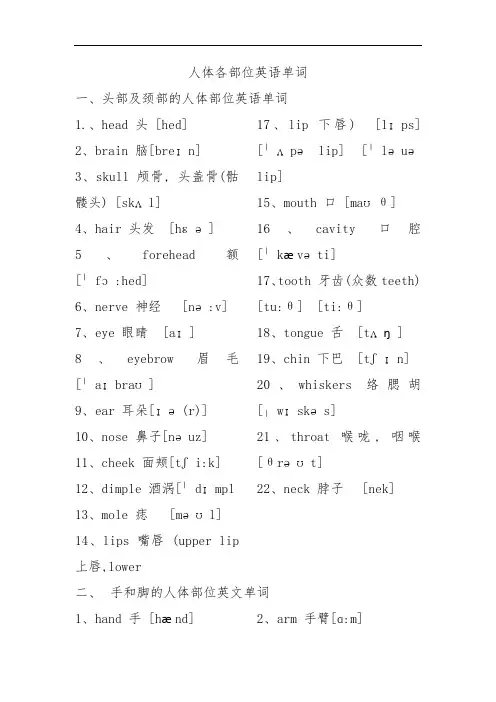
人体各部位英语单词一、头部及颈部的人体部位英语单词1.、head 头 [hed]2、brain 脑[breɪn]3、skull 颅骨, 头盖骨(骷髅头) [skʌl]4、hair 头发 [hɛə]5、forehead 额[ˈfɔ:hed]6、nerve 神经 [nə:v]7、eye 眼睛[aɪ]8、eyebrow 眉毛[ˈaɪbraʊ]9、ear 耳朵[ɪə(r)]10、nose 鼻子[nəuz]11、cheek 面颊[tʃi:k]12、dimple 酒涡[ˈdɪmpl13、mole 痣 [məʊl]14、lips 嘴唇 (upper lip 上唇,lower 17、lip下唇) [lɪps] [ˈʌpə lip] [ˈləuəlip]15、mouth 口 [maʊθ]16、cavity口腔[ˈkævəti]17、tooth 牙齿(众数teeth) [tu:θ] [ti:θ]18、tongue 舌 [tʌŋ]19、chin 下巴 [tʃɪn]20、whiskers 络腮胡[ˌwɪskəs]21、throat 喉咙, 咽喉[θrəʊt]22、neck 脖子[nek]二、手和脚的人体部位英文单词1、hand 手 [hænd]2、arm 手臂[ɑ:m]3、palm 手掌 [pɑ:m]4、finger 手指[ˈfɪŋgə(r)]5、nail 指甲 [neɪl]6、fist 拳头[fɪst]7、back 手背[bæk]8、wrist 手腕[rɪst]9、elbow 肘 [ˈelbəu]10、bone 骨 [bəʊn] 11、skeleton 骨骼[ˈskelɪtn]12、thigh 大腿[θaɪ]13、muscle 肌肉 [ˈmʌsl]14、knee 膝盖 [ni:]15、leg 腿 [leg]16、shank 小腿[ʃæŋk]17、foot 脚 [fut]三、人体胸部和下半身各部位英语单词1、shoulder 肩[ˈʃəuldə]2、pit 胸口 [pɪt]3、joint 关节 [dʒɔɪnt]4、chest 胸部[tʃest]5、abdomen 腹部[ˈæbdəmən]6、navel 肚脐 [ˈneɪvl]7、waist 腰[weɪst]8、back 背 [bæk]9、backbone 脊柱[ˈbækbəʊn]10、hip 臀部[hɪp]11、bottom 屁股[ˈbɔtəm]四、脏各部位英语单词1、vein 静脉[veɪn]2、artery 动脉[ˈɑ:təri] 3、capillary 毛细血管[kəˈpɪləri]4、nerve 神经[nɜ:v]5、spinal marrow 脊髓[ˈspaɪnəlˈmærəʊ]6、internal organs 脏[ɪnˈtɜ:nl][ˈɔ:ɡənz]7、heart 心脏 [hɑ:t]8、blood vessel 血管[blʌ d ˈvesəl]9、lung 肺 [lʌŋ]10、kidney 肾脏[ˈkɪdni]11、stomach 胃[ˈstʌmək]12、gullet 食管[ˈgʌlɪt]13、liver 肝脏[ˈlɪvə(r)]14、pancreas 胰腺[ˈpæŋkriəs]15、spleen 脾 [spli:n]16、small intestine 小肠[smɔ:l ɪnˈtestɪn] 17、large intestine 大肠[lɑ:dʒɪnˈtestɪn] 18、anus 肛门[ˈeɪnəs]19、bladder 膀胱[ˈblædə(r)]20、urine 尿道[ˈjʊərɪn]常见蔬菜1 tomato [tə'mɑ:təʊ]西红柿2、 lettuce ['letɪs] 莴苣3 cucumber ['kju:kʌmbə]黄瓜4 aubergine['əʊbəʒi:n], eggplant ['egplɑ:nt] ]茄子5 celery ['selərɪ]芹菜6 onion ['ʌnjən ]洋葱7 pea [pi:] 豌豆8 mushroom ['mʌʃru:m]蘑菇9 pumpkin ['pʌm(p)kɪn]南瓜10 rape [reɪp] 油菜11 spinach [ˈspɪnɪtʃ]菠菜12 beet, beetroot ['bi:tru:t] 甜菜13potato [pə'teɪtəʊ]马铃薯14 radish ['rædɪʃ]萝卜15 carrot ['kærət] 胡萝卜16 cabbage ['kæbɪdʒ]卷心菜17 Chinese cabbage 大白菜18 chilli ['tʃɪlɪ]辣椒19 garlic ['gɑ:lɪk]蒜20 chive [tʃaiv] 葱常见动物类1 horse [hɔ:s] 马2 mare [meə] 母马3 colt [kəʊlt] foal [fəʊl] 小马4 mustang ['mʌstæŋ]野马5 hippopotamus[,hɪpə'pɒtəməs]河马6 zebra ['zebrə] 斑马7 ox [ɑks] 牛8 buffalo ['bʌfələʊ]水牛9 Bulls、 [bulz] 公牛10 cow [kaʊ] 母牛11 calf [kɑ:f] 小牛12 heifer ['hefə] 小母牛13 rhinoceros[raɪ'nɒs(ə)rəs] 犀牛14 yak [jæk] 牦牛15 eagle ['i:g(ə)l]鹰16 mule [mju:l] 骡17 ass, donkey 驴18 cock [kɒk] 公鸡19 hen [hen] 母鸡20 chicken ['tʃɪkɪn]小鸡21 peacock ['pi:kɒk]孔雀22 duck [dʌk] 鸭23 pig, swine [swaɪn]猪24 gilt [gɪlt] 小母猪25 piglet ['pɪɡlət]猪崽26 hog [hɒg] 肥猪27 goose[gu:s] 鹅28 sheep [ʃi:p] 羊29 ewe [ju:] 母羊30 goat [gəʊt] 山羊31 lamb [læm] 羊羔,羔羊32 antilope ['æntilɔp]羚羊33 swan [swɒn] 天鹅34 deer [dɪə] 鹿35 giraffe [dʒɪ'rɑ:f]长颈鹿36 camel ['kæm(ə)l]骆驼37 ostrich ['ɒstrɪtʃ]鸵鸟38 elephant['elɪf(ə)nt] 象39 gull [gʌl] seagull ['si:gʌl] 海鸥40 woodpecker['wʊdpekə] 啄木鸟41 cat 猫42 parrot ['pærət] 鹦鹉43 lion ['laɪən] 狮44 cuckoo ['kʊku:]杜鹃45 leopard ['lepəd]豹46 crow [krəʊ] 乌鸦47 tiger ['taɪgə] 虎48 blackbird['blækbɜ:d] 画眉49 thrush [θrʌʃ] 画眉50 magpie ['mægpaɪ]喜鹊51 swallow ['swɒləʊ]燕子52 sparrow ['spærəʊ]麻雀53 dog 狗54 fox [fɒks] 狐55 wolf [wʊlf] 狼56squirrel ['skwɪr(ə)l] 松鼠57 bear [beə] 熊58 penguin ['peŋgwɪn]企鹅59 rabbit ['ræbɪt] 兔子60 hare [heə] 野兔61 rat [ræt] 鼠62 vole [vəʊl] 田鼠63 snake [sneɪk] 蛇64 boa ['bəʊə] 王蛇,蟒蛇65 monkey ['mʌŋkɪ]猴子66 python ['paiθən]蟒蛇67 orangutan [ɔ:,ræŋu:'tæn] 猩猩68 chimpanzee[tʃɪmpæn'zi:] 黑猩猩69 lizard ['lɪzəd]蜥蜴70 chameleon [kə'mi:lɪən] 变色龙71 wall lizard ['lizəd]壁虎72 duckbill ['dʌkbɪl] platypus ['plætɪpəs]鸭嘴兽73 kangaroo[,kæŋgə'ru:] 袋鼠74 giant salamander ['dʒaɪənt]['sælə,mændə] 娃娃鱼75 koala [kəʊ'ɑ:lə]考拉76 crocodile['krɒkədaɪl] 鳄鱼77 hedgehog ['pɔ:kjʊpaɪn] 刺猬78 porcupine['pɔ:kjʊpaɪn]豪猪79 bat [bæt] 蝙蝠80 turtle ['tɜ:t(ə)l]龟81 whale [weɪl 鲸82 dolphin ['dɒlfɪn]河豚83 sea turtle ['tɜ:t(ə)l] 海龟84 frog [frɒg] 青蛙85 seal [si:l] 海豹86 toad [təʊd] 蟾蜍常见水果apple 苹果2、banana 香蕉3、cherry 樱桃4.Chinese 、gooseberry、猕猴桃5、coconut椰子6、plum子7、date枣8、fig无花果9、litchi 荔枝10、gingko白果,银杏11、grape葡萄12、cantaloupe哈密瓜13、hawthorn山楂14、honey peach水蜜桃15、juicy peach 水蜜桃16、jujube枣17、lemon柠檬18、longan 桂圆,龙眼19、loquat 枇杷20、mandarin柑桔21、mango 芒果22、muskmelon甜瓜23、navel orange脐橙24、nut 坚果25、oleaster 沙枣26、olive橄榄27、orange柑桔28 tangerine柑桔29、papaya 木瓜30、peach 桃子31、pear梨32、pineapple 菠萝33、pomegranate石榴34、pomelo 柚子,文旦35、red bayberry梅36、strawberry草莓37、watermelon西瓜常见乐器1.钢琴Piano、[piˈænəʊ]2.小提琴Violin、[ˌvaɪəˈlɪn]3.大提琴 Cello、[ˈtʃeləʊ]3.吉他、Guitar、[gɪˈtɑ:(r)]4.竖琴 Harp、[hɑ:p]5. 竖笛 Recorder、[rɪˈkɔ:də(r)]6.长笛 Flute、 [flu:t]7.短笛 piccolo、[ˈpɪkələʊ]8.萨克斯Saxophone[ˈsæksəfəʊn]9.大号 Tuba、[ˈtju:bə]10.小号 Trumpet、[ˈtrʌmpɪt]11.手风琴accordion、[əˈkɔ:diən]12.小鼓 side drum、 [said drʌm]13. 大鼓bass drum、[beis drʌm]14. 口琴harmonica、[hɑ:ˈmɒnɪkə]15. 手风琴accordion [əˈkɔ:diən]16、电子琴keyboard [ˈki:bɔ:d]17. 鼓drum、 [drʌm]18. 二胡urheen ['ɜ:hi:n]19. 琵琶lute [lu:t]20. 筝zither [ˈzɪðə(r)交通工具1. bus公共汽车 [bʌs]2.car小汽车 [kɑ:(r)]3.bike自行车 [baɪk]、4.bicycle自行车[ˈbaɪsɪkl]5.motobike 摩托车[ˈməʊtəbaɪk]6.saloon 轿车[səˈlu:n]7 notchback 客货两用车['nɒtʃbæk]8.truck 卡车 [trʌk]pact car 小型汽车[kəmˈpækt kɑ:]10.light-van 小型货车['laɪtv'æn]11.garbage truck 垃圾车[ˈɡɑ:bidʒ trʌk]12.automobile carrier 货运卡车[ˈɔ:təməbi:l ˈkæriə]13.fire engine 消防车[ˈfaiəˈendʒin]14.ambulance 救护车[ˈæmbjələns]15.taxi 出租车, 计程车[ˈtæksi]16.jeep 吉普车 [dʒi:p]17.police car 警车[pəˈli:s kɑ:]18.wrecker 清障车[ˈrekə(r)]19.ambulance 急救车[ˈæmbjələns]20.highway公路[ˈhaɪweɪ] road公路[rəʊd]21.Express way高速公路[iksˈpres wei]22.aeroplane飞机[ˈeərəpleɪn]23.plane飞机[pleɪn]24.aircraf 飞机[ˈeəkrɑ:ft]25.airplane飞机[ˈeəpleɪn]26.spaceship 宇宙飞船[ˈspeɪsʃɪp]27.space shuttle 航天飞机[speis ˈʃʌtl]28.helicopter 直升飞机[ˈhelɪkɒptə(r)] 29.double decker bus 双层公共汽车[ˈdʌbl ˈdekəbʌs]30.coach 长途客运汽车[kəʊtʃ],31 motor coach大客车[ˈməutə kəutʃ] 32.trolleybus 无轨电车[ˈtrɒlibʌs]33.tramcar有轨电车['træmkɑ:],34.streetcar[ˈstri:tkɑ:(r)]有轨电车35.underground地铁[ˈʌndəgraʊnd]36 tube地铁[tju:b]37 subway [ˈsʌbweɪ] 地铁38.train 火车 [treɪn]39.warship 军舰[ˈwɔ:ʃɪp]40.ferry渡船[ˈferi]41.tanker油轮[ˈtæŋkə(r)]42.liner邮轮[ˈlaɪnə(r)]43.speedboat快艇[ˈspi:dbəʊt] 44.yacht游艇[jɒt]45.freighter货船[ˈfreɪtə(r)]46.submarine潜艇[ˌsʌbməˈri:n]校园词汇1.上学go to school [ɡəu tu: sku:l] [kʌm tu: sku:l] [kʌm tu: sku:l]2.放学回家leave school leave school3.回家return home [riˈtə:n həum]/ come back home [kʌm bæk həum]/ get home [ɡet həum]4.校门school gate [sku:l ɡeit]5.操场playground[ˈpleɪgraʊnd]/sports ground [spɔ:ts ɡraund]/drill ground [dril ɡraund]6.运动场sports ground [spɔ:ts ɡraund]/ playground [ˈpleɪgraʊnd]/schoolyard [ˈsku:ljɑ:d]7.篮球场basketball court [ˈbɑ:skitbɔ:l kɔ:t]8.排球场volleyball court [ˈvɔlibɔ:l kɔ:t]9.足球场football court [ˈfutbɔ:l kɔ:t]10.假山rockery [ˈrɒkəri]11.喷水池spray fountain[sprei ˈfauntin]12.林荫小道alameda [ˌælə'meɪdə]13. 花坛parterre [pɑ:ˈteə(r)]14.旗杆flagstaff [ˈflægstɑ:f]15.国旗national flag [ˈnæʃənəl flæɡ]16.保安员Security Officer[si`kjuəriti] [ `ɔfisə]ˈ17.宿管员dormitory managing clerk[ˈdɔ:mətri] ['mænɪdʒɪŋ] [klɑ:k]18.清洁工cleaner [ˈkli:nə(r)]19小卖部canteen [kænˈti:n]20.食堂mess hall [mes hɔ:l]/mess [mes]/ canteen [kænˈti:n]21.食堂工人The canteen workers [ðə] [kænˈti:n] ['wɜ:kəz]22.厨师cook [kʊk]23.服务员waiter [ˈweɪtə(r)]24.图书馆、图书室library [ˈlaɪbrəri]25. 图书管理员library [ˈlaɪbrəri]26.教室classroom/ school room27.书桌desk [desk]28.椅子chair [tʃeə(r)]29.讲台dais [ˈdeɪɪs]30.黑板blackboard [ˈblækbɔ:d]31.粉笔chalk tʃɔ:k]32.美术室art room[ɑ:t ru:m]33.音乐室music room [ˈmju:zik ru:m]34.阅览室Reading Room [ˈri:diŋ ru:m]35.实验室laboratory [ləˈbɒrətri]36.物理实验室physics laboratory [ˈfiziksləˈbɔrətəri]37.化学实验室chemical laboratory [ˈkemikəl ləˈbɔrətəri]38. 生物实验室biology laboratory[baiˈɔlədʒi ləˈbɔrətəri]39.游泳池swimming pool [ˈswɪmɪŋ pu:l]40.宿舍dormitory [ˈdɔ:mitri]/dorm [dɔ:m]/42.校长schoolmaster [ˈsku:lmɑ:stə(r)]/president [ˈprezɪdənt]/43.老师teacher[ˈti:tʃə(r)]/schoolmaster [ˈsku:lmɑ:stə(r)]44.语文老师language teacher[ˈlæŋɡwidʒˈti:tʃə]45.数学老师maths teacher[mæθs] ˈti:tʃə46.英语老师English teacher47.物理老师physics teacher[ˈfɪzɪks]48.化学老师chemistry teacher[ˈkemɪstri]49.生物老师biology teacher[baɪˈɒlədʒi]50.地理老师geography teacher[dʒiˈɔɡrəfi]51.历史老师history teacher [ˈhɪstri]52.政治老师politics teacher [ˈpɒlətɪks]53.信息老师computer teacher [kəmˈpju:tə]54.体育老师physical education teacher [ˈfizikəl ˌedju:ˈkeiʃən]55.音乐老师music teacher[ˈmju:zik]56.美术老师art teacher [ɑ:t]57.学生student [ˈstju:dnt]/pupil[ˈpju:pl]/58.同学schoolmate [ˈsku:lmeɪt]/ condisciple [ˌkɒndɪ'saɪpl]59.同班同学classmate [ˈklɑ:smeit]60.班长monitor [ˈmɒnɪtə(r)]/ class monitor[klɑ:s ˈmɔnitə]61.学习委员commissary in charge of studies [ˈkɒmɪsəri] [tʃɑ:dʒ] ['stʌdɪz]62.劳动委员commissary in charge of labour [ˈleibə]63.体育委员commissary in charge of physical culture [ˈfizikəl ˈkʌltʃə]64.文娱委员commissary in charge of recreational activities [ˌrekriˈeɪʃənl] [ækˈtivitiz]65.组长headman [ˈhedmæn]66.小组长gang boss [ɡæŋ bɔs]67.上课attend class[əˈtend klɑ:s]/go to class[ɡəu tu: klɑ:s]68.听课attend a lecture[əˈtend ei ˈlektʃə]/sit in on a class[sit in ɔn ei klɑ:s]69.作笔记take notes [nəuts]70.记录record [ˈrekɔ:d]71.听写dictation [dɪkˈteɪʃn]72.默写write from memory [rait frɔm ˈmeməri]73.讨论discuss[dɪˈskʌs]/talk over [tɔ:k ˈəuvə]74.听老师讲课listening to the teacher['lɪsənɪŋ]75.帮助assist [əˈsɪst]76.听录音listen to recording[ˈlisn] [rɪˈkɔ:dɪŋ]77.做作业do the homework [ˈhəʊmwɜ:k]78.做练习do exercise [du: ˈeksə]79.下课get out of class/ finish class/come off from class[kʌm ɔ f frʌm klæs]80.画图picture [ˈpɪktʃə(r)]81.画vt.draw82.起立stand up/ uprise ['ʌpraɪz]/ n standing [ˈstændɪŋ]83. 坐下sit down[sit daun]/squat down[skwɔt daun]84.举手raise your hand [reɪz] [hænd]85.回答answer [ˈɑ:nsə(r)]/ reply[rɪˈplaɪ]/ rejoin [ˌri:ˈdʒɔɪn]86.回答问题answer the question [ˈɑ:nsəðəˈkwestʃən]87.交头接耳bill and coo [bil ænd ku:]88.搞小动作make petty moves[meɪk] [ˈpeti] [mu:v]89.认真听讲listen carefully [ˈlisn] ['keəfəlɪ]90.嘲笑ridicule [ˈrɪdɪkju:l]91.打架fight [faɪt]/ fray[freɪ]/ scrap[skræp]92.辱骂vt. abuse [əˈbju:s]93.欺骗v. hoax [həʊks]94.听音乐listen to music [ˈlisn tu: ˈmju:zik]95.看书read a book [ri:d ə buk]96.书法handwriting [ˈhændraɪtɪŋ]97.打篮球play basketball[pleɪ] [ˈbɑ:skɪtbɔ:l]98.打乒乓球playtable tennis[ˈteibl ˈtenis] /playtable tennis ball[ˈteibl ˈtenis bɔ:l]99.打羽毛球play shuttlecock[ˈʃʌtlkɒk]100.打排球playvolleyball[ˈvɒlibɔ:l]101.踢足球play football [plei ˈfutbɔ:l]102.游泳swim [swɪm]103.播音broadcast [ˈbrɔ:dkɑ:s t]104.播音员broadcaster [ˈbrɔ:dkɑ:stə(r)]105.唱歌sing [sɪŋ]106.跳舞dance [dɑ:ns]107.表演perform [pəˈfɔ:m]/ act[ækt]108.排练节目rehearsing a play[rɪˈhɜ:sɪŋ] [ə] [pleɪ]109.排练舞蹈rehearsing dance[rɪˈhɜ:sɪŋ] [dɑ:ns] 110.演小品 act short sketch [ækt][ʃɔ:t sketʃ] 111.说相声perform crosstalk [pəˈfɔ:m] [ˈkrɒstɔ:k]。
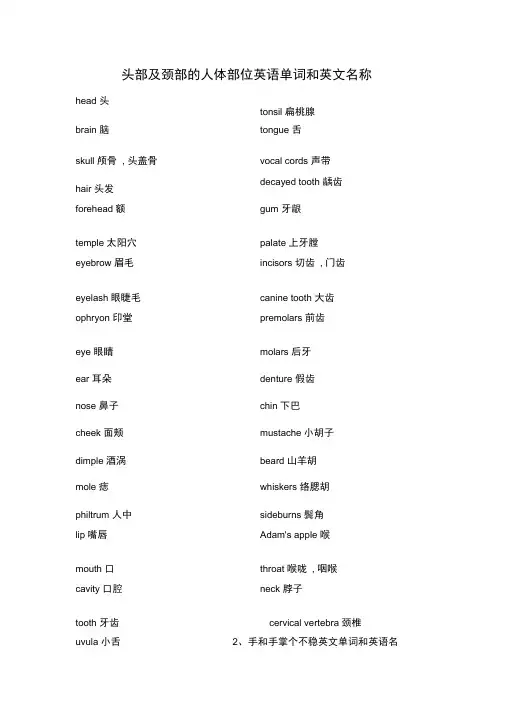
头部及颈部的人体部位英语单词和英文名称head 头tonsil 扁桃腺brain 脑tongue 舌skull 颅骨, 头盖骨vocal cords 声带decayed tooth 龋齿hair 头发forehead 额gum 牙龈temple 太阳穴palate 上牙膛eyebrow 眉毛incisors 切齿, 门齿eyelash 眼睫毛canine tooth 大齿ophryon 印堂premolars 前齿eye 眼睛molars 后牙ear 耳朵denture 假齿nose 鼻子chin 下巴cheek 面颊mustache 小胡子dimple 酒涡beard 山羊胡mole 痣whiskers 络腮胡philtrum 人中sideburns 鬓角lip 嘴唇Adam's apple 喉mouth 口throat 喉咙, 咽喉cavity 口腔neck 脖子tooth 牙齿cervical vertebra 颈椎uvula 小舌2、手和手掌个不稳英文单词和英语名nerve 神经shoulder 肩elbow joint 肘关节 hand 手arm 手臂 palm 手掌 finger 手指 nail 指甲 thumb 大拇指 forefinger 食指 middle finger 中指 third finger无名指 little finger小指ball 拇指腕掌 half moon 甲晕 fist 拳头 knuckle 指关节 back手背 wrist 手腕 elbow 肘shoulder blade 肩胛骨 shoulder joint 肩关节 pit胸口breastbone 胸骨 joint 关节 rib 肋骨 chest 胸部nipple 乳头 armpit 腋下 armpit hair 腋毛 abdomen 腹部 navel 肚脐 waist 腰 lumbarvertebrae 腰椎 back 背 backbone 脊骨 , 脊柱 blood vessel 血管 vein 静脉collarbone 锁骨3、人体胸部和下半身各部位英语单词 和英文名称 artery 动脉 capillary 毛细血管windpipe 气管bladder 膀胱heart 心脏penis 阴茎diaphragm 隔膜testicles 睾丸lung 肺scrotrum 阴囊kidney 肾脏urine 尿道stomach 胃ovary 卵巢gullet 食管womb子宫liver 肝脏vagina 阴道gall bladder 胆囊bone 骨pancreas 胰腺skeleton 骨骼spleen 脾thigh 大腿duodenum 12指肠kneecap 膝盖骨small intestine 小肠sinew 腱large intestine 大肠muscle 肌肉blind gut 盲肠knee 膝盖vermiform. appendix 阑尾leg 腿rectum 直肠shank 小腿anus 肛门calf 小腿肚hip 臀部foot 脚buttock 屁股instep 脚背pelvis 骨盆toes 脚趾private parts 阴部ankle 脚踝Achilless tendon 跟腱heel 脚后跟sole 脚底arch 脚掌心spinal marrowinternal organs脊髓内脏。
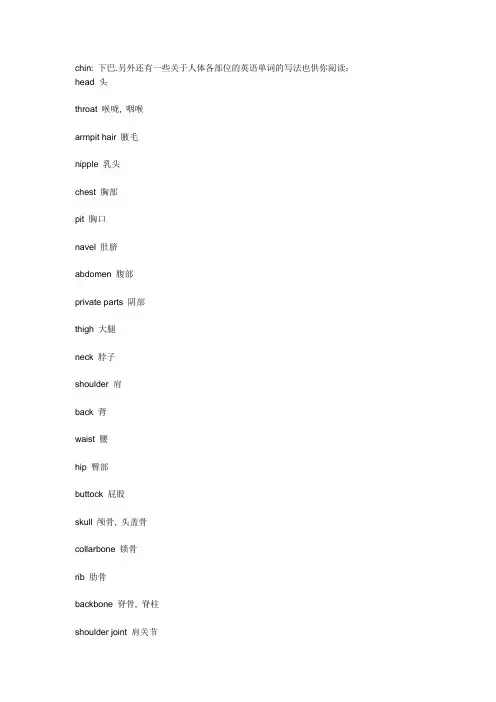
chin: 下巴.另外还有一些关于人体各部位的英语单词的写法也供你阅读:head 头throat 喉咙, 咽喉armpit hair 腋毛nipple 乳头chest 胸部pit 胸口navel 肚脐abdomen 腹部private parts 阴部thigh 大腿neck 脖子shoulder 肩back 背waist 腰hip 臀部buttock 屁股skull 颅骨, 头盖骨collarbone 锁骨rib 肋骨backbone 脊骨, 脊柱shoulder joint 肩关节shoulder blade 肩胛骨breastbone 胸骨elbow joint 肘关节pelvis 骨盆kneecap 膝盖骨bone 骨skeleton 骨骼sinew 腱muscle 肌肉joint 关节blood vessel 血管vein 静脉artery 动脉capillary 毛细血管nerve 神经spinal marrow 脊髓brain 脑respiration 呼吸windpipe 气管lung 肺diaphragm 隔膜internal organs 内脏gullet 食管stomach 胃liver 肝脏gall bladder 胆囊pancreas 胰腺spleen 脾duodenum 12指肠small intestine 小肠large intestine 大肠blind gut 盲肠vermiform appendix 阑尾rectum 直肠anus 肛门kidney 肾脏bladder 膀胱penis 阴茎testicles 睾丸scroticles 阴囊ovary 卵巢womb 子宫vagina 阴道hair 头发forehead 额temple 太阳穴eyebrow 眉毛eye 眼睛ear 耳朵cheek 面颊nose 鼻子lip 嘴唇mouth 口bald head 秃头wrinkles 皱纹crow's-feet 鱼尾纹mole 痣Adam's apple 喉freckles 雀斑dimple 酒涡pimple 粉刺tooth 牙齿uvual 小舌tonsil 扁桃腺tongue 舌decayed tooth 龋齿gum 牙龈palate 上牙膛incisors 切齿, 门齿canine tooth 大齿premolars 前齿molars 后牙denlture 假齿mustache 小胡子beard 山羊胡whiskers 络腮胡sidebums 鬓角dark eye 黑眼睛brow eye 茶色眼睛blue eye 蓝眼睛hazel eye 淡褐色眼睛almond eye 杏仁眼double eye 双眼皮upturned nose 朝天鼻aquiline nose 鹰钩鼻snub nose 狮子鼻bulbous nose 球状鼻Grecian nose 悬胆鼻Roman nose 鹰鼻kinky hair 卷缩发wavy hair 波浪发straight hair 直发blond hair 金发thumb 大拇指forefinger 食指middle finger 中指third finger 无名指little finger 小指palm 手掌ball 拇指腕掌nail 指甲half moon 甲晕fist 拳头knuckle 指关节back 手背wrist 手腕elbow 肘armpit 腋下thigh 大腿knee 膝盖shank 小腿calf 小腿肚foot 脚instep 脚背toes 脚趾ankle 踝Achilles's tendon 跟腱heel 脚后跟sole 脚底arch 脚掌心。
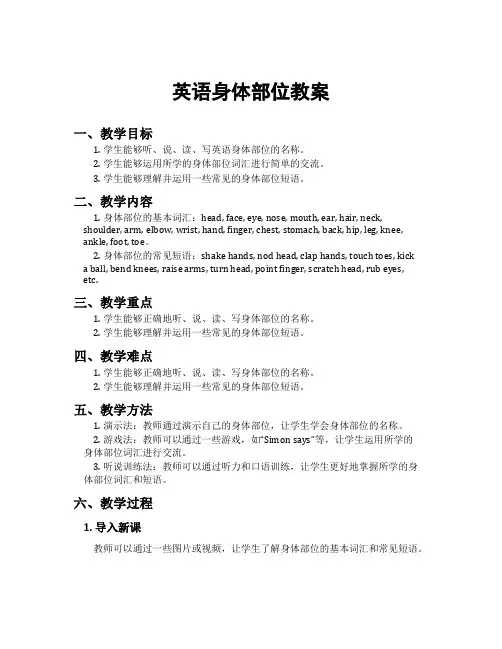
英语身体部位教案一、教学目标1.学生能够听、说、读、写英语身体部位的名称。
2.学生能够运用所学的身体部位词汇进行简单的交流。
3.学生能够理解并运用一些常见的身体部位短语。
二、教学内容1.身体部位的基本词汇:head, face, eye, nose, mouth, ear, hair, neck, shoulder, arm, elbow, wrist, hand, finger, chest, stomach, back, hip, leg, knee, ankle, foot, toe。
2.身体部位的常见短语:shake hands, nod head, clap hands, touch toes, kicka ball, bend knees, raise arms, turn head, point finger, scratch head, rub eyes, etc.三、教学重点1.学生能够正确地听、说、读、写身体部位的名称。
2.学生能够理解并运用一些常见的身体部位短语。
四、教学难点1.学生能够正确地听、说、读、写身体部位的名称。
2.学生能够理解并运用一些常见的身体部位短语。
五、教学方法1.演示法:教师通过演示自己的身体部位,让学生学会身体部位的名称。
2.游戏法:教师可以通过一些游戏,如“Simon says”等,让学生运用所学的身体部位词汇进行交流。
3.听说训练法:教师可以通过听力和口语训练,让学生更好地掌握所学的身体部位词汇和短语。
六、教学过程1. 导入新课教师可以通过一些图片或视频,让学生了解身体部位的基本词汇和常见短语。
2. 学习新词汇教师可以通过演示自己的身体部位,让学生学会身体部位的名称。
教师可以先指着自己的头,然后说出“head”,让学生跟着说。
然后再指着自己的脸,说出“face”,让学生跟着说。
以此类推,直到学生掌握所有的身体部位词汇。
3. 学习常见短语教师可以通过一些图片或视频,让学生了解身体部位的常见短语。
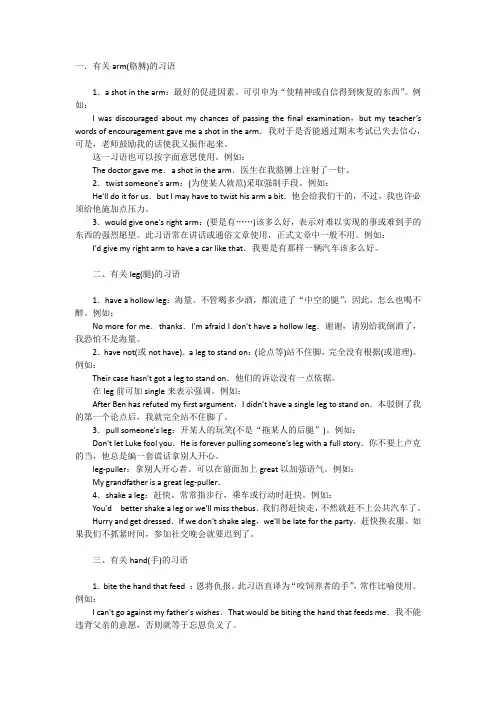
一.有关arm(胳膊)的习语1.a shot in the arm:最好的促进因素。
可引申为“使精神或自信得到恢复的东西”。
例如:I was discouraged about my chances of passing the final examination,but my teacher’s words of encouragement gave me a shot in the arm.我对于是否能通过期末考试已失去信心,可是,老师鼓励我的话使我又振作起来。
这一习语也可以按字面意思使用。
例如:The doctor gave me.a shot in the arm.医生在我胳膊上注射了一针。
2.twist someone's arm:(为使某人就范)采取强制手段。
例如:He'll do it for us.but I may have to twist his arm a bit.他会给我们干的,不过,我也许必须给他施加点压力。
3.would give one's right arm:(要是有……)该多么好,表示对难以实现的事或难到手的东西的强烈愿望。
此习语常在讲话或通俗文章使用,正式文章中一般不用。
例如:I'd give my right arm to have a car like that.我要是有那样一辆汽车该多么好。
二、有关leg(腿)的习语1.have a hollow leg:海量。
不管喝多少酒,都流进了“中空的腿”,因此,怎么也喝不醉。
例如:No more for me.thanks.I'm afraid I don’t have a hollow leg.谢谢,请别给我倒酒了,我恐怕不是海量。
2.have not(或not have).a leg to stand on:(论点等)站不住脚,完全没有根据(或道理)。
例如:Their case hasn't got a leg to stand on.他们的诉讼没有一点依据。
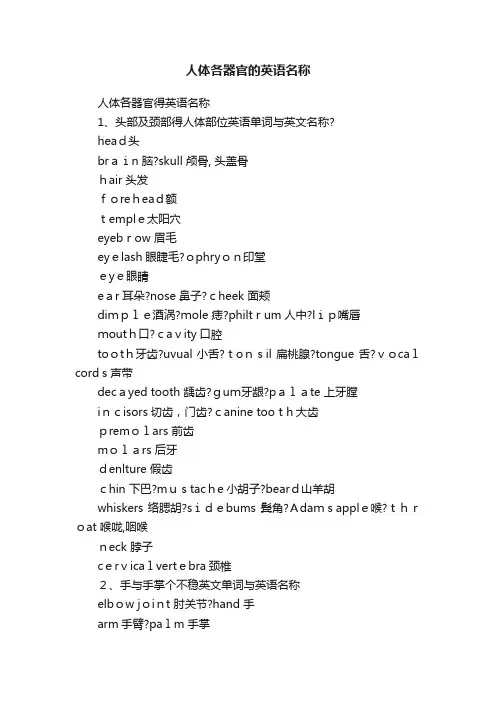
人体各器官的英语名称人体各器官得英语名称1、头部及颈部得人体部位英语单词与英文名称?head头brain 脑?skull 颅骨, 头盖骨hair 头发forehead额temple太阳穴eyebrow 眉毛eyelash眼睫毛?ophryon印堂eye眼睛ear耳朵?nose 鼻子?cheek 面颊dimple酒涡?mole 痣?philtrum人中?lip嘴唇mouth口?cavity口腔tooth牙齿?uvual 小舌?tonsil 扁桃腺?tongue 舌?vocalcords声带decayed tooth 龋齿?gum牙龈?palate 上牙膛incisors切齿,门齿?canine tooth大齿premolars 前齿molars 后牙denlture 假齿chin 下巴?mustache小胡子?beard山羊胡whiskers络腮胡?sidebums 鬓角?Adamsapple喉?throat 喉咙,咽喉neck 脖子cervicalvertebra颈椎2、手与手掌个不稳英文单词与英语名称elbow joint 肘关节?hand 手arm手臂?palm 手掌finger手指?nail 指甲?thumb大拇指forefinger食指?middlefinger中指?third finger 无名指?littlefinger小指?ball拇指腕掌half moon 甲晕?fist 拳头?knuckle 指关节3、人体胸部与下半身back手背?wrist手腕?elbow 肘??各部位英语单词与英文名称collarbone 锁骨shoulder肩shoulder blade 肩胛骨?shoulder joint 肩关节pit 胸口?breastbone胸骨?joint关节?rib 肋骨?chest 胸部?nipple 乳头?armpit 腋下armpit hair 腋毛?abdomen腹部navel 肚脐waist 腰?lumbar vertebrae腰椎?back背?backbone 脊骨,脊柱?bloodvessel血管?vein 静脉?artery动脉capillary毛细血管nerve神经?windpipe 气管?heart心脏?diaphragm 隔膜?lung 肺kidney肾脏stomach胃gullet食管liver 肝脏gall bladder胆囊pancreas 胰腺spleen脾?duodenum12指肠?small intestine 小肠large intestine 大肠?blind gut盲肠vermiform、appendix 阑尾?rectum 直肠?anus肛门hip 臀部buttock屁股pelvis骨盆?private parts阴部bladder 膀胱?penis 阴茎?testicles 睾丸?scroticles 阴囊?urine尿道?ovary卵巢womb 子宫vagina 阴道bone骨skeleton 骨骼thigh 大腿?kneecap膝盖骨?sinew腱?muscle 肌肉knee膝盖leg 腿shank 小腿calf小腿肚?foot 脚instep 脚背?toes 脚趾ankle脚踝?Achilless tendon跟腱?heel脚后跟sole脚底?arch 脚掌心spinal marrow脊髓?internal organs 内脏。
1. Head. The head is thought to be the most important part of the human body. So a leader is often compared to a head (首脑). Thus we have Head of State or the head of a delegation.The head is where the brain is located. It is naturally associated with ideas and intelligence. Very often, we need other people's ideas and opinions when we want to do something well. The is because two heads are better than one (三个臭皮匠顶个诸葛亮).2. Eye. The eyes are extremely precious to us. That is why we say" Mind your eye (当心)! When we reminding someone to be careful.Not only human beings and animals have eyes, many things also have" eyes"- the eyes of a ship, the eye of a needle, the eye of a typhoon, and so on.3. Ear. The ear is the organ of hearing. A piece of light music is easy on the ear(悦耳动听). We are usually all ears (专心聆听) for bit news.When they think somebody is overhearing, English people use either of the two proverbs: Walls have ears (隔墙有耳) and Pitchers have ears (壶罐有耳). They also think that little pitchers have big ears(小孩子耳朵尖). Nice boys and girls respect other people. They will not secretly listen to others' private conversations.4. Nose. The English phrase "face to face (面对面)" and its Chinese counterpart(对应)are exactly the same. But English people, to express the same idea, can say nose to nose instead. There is no such substitute in Chinese.The word nose appears in many idioms. Here are two which are quite similar to their Chinese equivalents: lead somebody by the nose (牵着某人的鼻子走) and turn up one's nose at somebody or something (对某人或某物嗤之以鼻).English people can say as plain as the nose in one's face (一清二楚) to mean "very obvious". May be to them, the nose is the most conspicuous part of the face.5. Lip. We have two lips: the upper lip and the lower lip. If one's two lips are closed, one cannot speak. So it goes without saying that "don't open your lips(不要开口)" means " don't speak".His lips are sealed. Are his lips really stuck together by wax or glue? No, his lips are sealed when asked about something that he must keep secret. Sometimes a top secret is betrayed because it has escaped someone's lips (脱口而出). Then the incident may become a piece of news that is on everybody's lips (众口相传).6. Tongue. We all know we cannot speak without the tongue. So the tongue is closely related to speech. To hold one's tongue (保持沉默) means "to keep silent". A person whohas too much tongue (太多嘴) is disliked by all, for he is too talkative. Mother tongue is not the tongue of a mother: it is a person's native language."Don't you have a moth below your nose (你鼻子底下不是有张嘴吗)?" The Chinese say so to blame a person who did not say what he should have said. But this not the right way to express the idea in English. English people would say, "You have a tongue in your head, haven't you?"7. Face. Face has to do with the idea of respect and dignity both in Chinese and English. You lose your face (丢面子) if you fail again and again, but a decisive victory will save your face (挽回面子) after all your failures.When you feel unhappy, you pull a long face (拉长脸). The idea is conveyed in Chinese in the same way. But "about face (向后转)" does not refer to the face. It is a military order to turn round and face in the opposite direction. It is the exact equivalent of " about turn".8. Shoulder. The shoulders can bear heavy things. Your father has a great responsibility for the family on his shoulder. When faced with difficulty, the family should stand shoulder to shoulder (肩并肩) to overcome it. You should not turn a cold shoulder (不理睬) to your family members. Nor should you give your friends the cold shoulder (冷落朋友). Both expressions mean treating others coldly.9. Back. A good host is hospitable to his guests. But, if guest is tiresome, the host is glad to see his back (他离开).If your friend has done something really well, you may give him a pat on the back (轻轻拍背部) to show your appreciation.If you turn your back on somebody (不理睬他人), you mean you do not like making friends with that person.10. Heart. The heart is an extremely important organ inside the chest. It usually stands for something important or the centre of something, for example, the heart of the matter (问题的核心) or the heart of mystery.Many other expressions make use of the word heart. A lover can be called a sweet heart (情人). The Purple Heart (紫心徽章) is a medal given as an honor to American soldiers wounded in battle.If your friend is in trouble, you may encourage him by saying "Don't lose heart (不要灰心)."11. Stomach. The stomach is naturally related to one's appetite. If you dislike heavy food, you have no stomach for it (反胃). The word is also related to one's interests or likings. If you find something boring or vulgar, you have no stomach for it, either. Bad food turnsyour stomach. Similarly, your stomach turns at a bad joke.Stomach can also be a verb. Look at this example: "How could you stomach (忍受) such rude words?" Apparently, stomach here can be replaced by "tolerate".12. Arm. Every person has two arms: the right arm and the left arm. The right arm is usually stronger, so we call a good helper the right arm (得力助手).We all know an arm is not very long. But when you keep someone at arm's length (保持距离), the distance is long enough. For that means you don not like that person and you try your best to avoid him or her. We should indeed keep the bad friends at arm's length.13. Hand. Quite a number of phrases formed form the word hand are very similar to their Chinese counterparts. Here are some obvious examples: a fresh hand (新手), short of hands (人手短缺), hand in hand (手拉手) and wash one's hands of something (洗手不干了). But do not always take this for granted. Study these examples and you will understand.He lives from hand to mouth (He has just enough money to live on). We gave them a big hand (We gave them lots of applause).14. Finger. How many fingers does each of your hands have? Now let's name them in English from the smallest: the little finger, the ring finger, the middle finger, the index finger and thumb.Each finger has its own part to play. If your fingers are all thumbs (笨拙), that is too bad. That means you are very clumsy.15. Thumb. Chinese people turn up their thumbs to express appreciation. English peopled so to express not only appreciation but also approval. Chinese people never turn their thumbs down to mean anything. But English people do. They do so to show depreciation disapproval. Thus in English you can say, "We turn thumbs up (赞成) to Jack's suggestion but they turn thumbs down (不赞成) to it." Similarly, you can warmly praise someone by saying "Thumbs up (真棒)!" and show your dissatisfaction by saying "Thumbs down (差劲)!"16. Nail. If you see two of your classmates fighting tooth and nail (又抓又咬), you must stop them at once. Otherwise, at least one of them would be hurt.Nail also means a thin pointed piece of metal for hammering into something.But it is related to the body in this sentence: "Peter is as hard as nails (结实的象铁打的)." We all hope that we are as strong and healthy as he is.Then if I say you have hit the nail on the head (中肯,一针见血), I don not mean that you have done something cruel. I mean that you have said exactly the right thing.17. Leg. The word leg appears in many colloquial expressions. At a party, when you feel like dancing, you can say to a good friend of yours, "Let's shake a leg." Obviously, it means " Let's dance." When you want your fiend to hurry, you can also "shake a leg". In American English it means "hurry".The arms and legs are very important to us. Therefore when asked why you are not going to buy something expensive, you may answer, "It costs an arm and a leg!" You mean that it is really expensive. If you pull one's leg, it means you make fun of someone.18. Toe. To convey the idea "from head to foot", English people san say from top to toe. But Chinese people don't.Some people turn their toes out (八字脚) when they walk. Some turn their toes in.When faced with danger, we must be alert and ready for action, that is to say, we must be on our toes (保持警惕).19. Skin. Human beings have skin. So have animals and plants. The skin can be think or thin. A think-skinned person, or a person who has a thin skin, is easily upset or offended while a thick-skinned person, or a person who has a think skin, is quite the contrary. Both expressions are sometimes derogatory (贬义).That is to say, sometimes the former refers to a person who is too sensitive; the latter a person who has little sense of shame.20. Hair. Most people will only think of the hair on our head when the word hair is mentioned. In fact, some animals and plants also have hair.A horrible scene may make a person's hair stand on end (毛骨悚然). But a courageous person will not turn a hair (不畏惧) even though he is in face of danger.Sometimes, a friend of yours may be so angry that he may act foolishly. Then you had better give him this advice: "Keep your hair on (别发脾气)".眼睛an eye for eye 以牙还牙have bedroom eye有一双性感的眼睛an eye for something对某物有鉴赏力eye someone细看某人,打量某人have eyes bigger than one’s stomach眼馋肚饱four-eyes四眼(对戴眼镜者的贬称)give someone a black eye 把某人打鼻青眼肿make goo-goo eyes at someone对人抛媚眼green-eyed monster嫉妒心in a pig’s eye胡说,废话keep one’s eyes peeled 留心,警惕see eye-to-eye 看法一致耳朵be all ears 聚精会神地听,洗耳恭听bend someone ear与某人喋喋不休blow it out one’s ear胡说八道chew someone’s ear off对某人喋喋不休have an ear for music有音乐方面的天赋fall on deaf ears和没有心思的人说话;没被理睬good ear 辨别声音keep one’s ear to the ground注意听perk up one’s ear引起注意,坚起耳朵play by ear 听过歌曲后,不看乐谱而凭记忆演奏put a bug in someone’s ear事先给某人暗示;警告某人talk someone’s ear off因喋喋不休而惹怒某人鼻子as plain as the nose on one’s face一目了然,显而易见keep one’s nose to the grindstone埋头苦干,勤奋工作“It’s on skin off my onse”与我毫无关系take a nose dive突然衰弱,突然变弱have a nose for finding something善于发现某事物nose out 以微弱的优势打败对手,险胜get one’s nose in the air媚上傲下的,自负的pay though the nose to花很多钱poke one’s nose in someone’s business干预某人的事物,管闲事right under one’s nose显而易见的,一目了然turn one’s nose up at someone or something拒绝某人或某事嘴巴bad-mouth someone说某人坏说,撒布流言蜚语big-mouth 多嘴的人,喋喋不休的down in the mouth神情沮丧的,垂头丧气live hand –to-mouth勉强糊口,勉强维持生活mouth off傲慢无礼,顶嘴run off at the mouth滔滔不绝地淡论,没完没了shoot off one’s mouth随便乱说,信口开河手at hand紧迫的,重要的give someone a hand 帮助某人hand it to someone佩服某人hands down无疑,当然know something like the back of one’s对某事物了如指掌live hand-to-mouth毫无积蓄,勉强糊口an old hand at something做某事的老手,熟手on hand在手头,现有out of hand失去控制,无法控制the right hand doesn’t know what the left handis doing互不通气try one’s hand at something试试身手脚get back on one’s feet 从失败中重新站起来get cold feet在最后时刻失去勇气,临阵畏缩foot the bill付账,买单get a foot in the door迈向目标的第一步get one’s feet wet逐渐熟悉情况hotfoot it急匆匆one foot in the grave一只脚已经踏入坟墓,行将就木put one’s foot down禁止,阻止pussy-foot around谨言慎行,拐弯抹角quick on one’s own two feet很快想出办法be swept off one’s feet被诱惑,被迷住stand on one’s own two feet独立自主,自主throw oneself at someone’s完全屈服于某人,完全拜倒在某人脚下get under one’s feet阻碍某人,妨碍某人get off on the wrong foot (朋友之间)刚开始时关系不好。